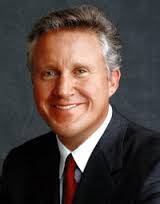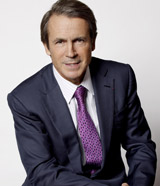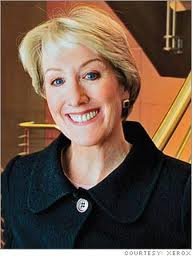In May, I had the opportunity to interview Tom Enders, CEO of EADS. The company is often better known for its Airbus division. EADS is a pan-European corporation that employs over 140 000 people and generated revenues of nearly €57 billion last year. It is a fascinating company for many reasons; its governance with diverse political interests, the strategic importance of the aeronautical industry and the very international structure of the organization. I am very grateful to Tom Enders and his team at EADS for a very open discussion I had.
In this three part interview, German-born Enders talks about the day to day challenges of running such a complex company, how strategy can be hampered by politics and gives some advice to young graduates beginning their careers.
EADS’ Internationalization: Tom Enders on the Global Mentality
What are the challenges of running a large international corporation like EADS?
The heart of the business is our commercial aircraft business, Airbus, and Eurocopter, so 2/3 of the business, and our institutional business is 20-25%. The challenges of running EADS are similar to those of any big international company which is in a changing environment.
The central challenge is to have the best possible international team at the top, and really have a good orchestra, not just solo players. One of the most important things for the CEO is not to micromanage the business, and give our orientation, as far as strategy is concerned, and to look after HR development. Human resources are the key factor.
We should not just focus on Europe, but see how to get the best and brightest worldwide. As CEO, I also have the responsibility to take people, mentor, and follow through with them to management positions one day.
I also believe in good corporate planning. What I mean by that is not rigid ten-year planning but rather planning which considers options and scenarios.
When you say that HR is the most important aspect, are you referring to talent management in particular?
Yes. If you don’t develop talent, people will get frustrated very quickly within their job, and they will eventually leave. It is vital for our European company to make it more outward looking and international. With the Euro crisis and stagnation occurring, the relative share of Europe in the world market is declining.
We are well aware that more than 80% of all Airbus’ deliveries are going outside of Europe, which shows the decreasing importance of Europe in our industry. The Euro crisis concerns me less than if China had the flu. Yet, our human resources side needs to keep pace with that. In terms of employment, we are 95% European. Our business is swinging towards Asia and the Middle East, and other parts of the world, to make this very European company much more global in the future.
We can manage this transition because EADS has all the right tools and resources to do that, compared to the big American companies that are ‘just American.’ Already at the core, we are very ‘international.’
Will there still be jobs left in Europe in 20 years?
Of course, if we are very successful with our internationalization, we will still have 70% of the people working in Europe. There is no reason to doubt that. We need to act now. It comes down to markets and talents. The old philosophy that we don’t have to offer something to potential partners we want to sell to is now gone.
You said go to Asia. Does it have to be China?
No, it doesn’t have to be China. Let me give you an example. A couple of years ago, when I was running Airbus, my innovators came to me and proposed an Innovation Cell, an Airbus initiative to develop technologies and aircraft 20-30 years ahead. Then, the next thing they showed me was a map, and the map was Europe. That didn’t fit. They should have had a map of Asia and I told them so. Well, this Innovation Cell is now in Bangalore, India.
Consider our future business, from the perspective of these growing markets. We need to make the transition to force ourselves to accept this changing paradigm. This may lead to having more than just Asian representation on the Board of Directors in 10-20 years in executive management, but maybe even working directly in headquarters.
Currently, we have one headquarters in Toulouse and two additional offices in Paris and in Munich. One of the members of our EADS Board of Director and a visionary industry leader, not too long ago suggested we had it all wrong. According to him, EADS should think about having its headquarters in Hong Kong, where future business is. An interesting thought but probably a step too far, for we also have to consider our manufacturing side. Being 10,000 kilometers from our manufacturing would not work, compared to working in a consulting or banking company. We are so dependent on the hardware side, but that is the kind of thinking we need to generate in the company, the big challenge for us in the next years.
Do you think there are big distinctions today between the American, European, or Asian stars of management or does everyone manage in the same way? Have we all adapted?
I think the borders are increasingly blurred. The predominant style today is American/Anglo-Saxon. It is not a surprise when you consider where the biggest and best schools are and which language they speak.
I think it’s increasingly also about what our employees request, which again is influenced by what they are taught in the business schools. Let’s look at young French or German students, for example. They love to study in the US, UK, Australia, and Singapore, and when they come to work in companies, they have certain demands and requirements. Management is now responding to this.
With this internationally-minded generation the talent of the company comes up into the senior management. They have a different management style and are sometimes motivated by different things. My impression today is that the future managers are going to be a lot more international than before.
See also:
An Interview with Tom Enders, CEO of EADS (Airbus) Part 2: Strategy and execution in the aircraft industry)
 Tom Enders is the CEO of EADS, the parent company of Airbus, the giant commercial aircraft company. EADS is a pan European corporation that employs over 140 000 people and generated revenues of nearly €57 billion last year. In the second part of this three-fold interview, Tom Enders talks about strategic execution at Airbus and EADS, how politics can influence strategic plans and the relationship between Airbus and Boeing.
Tom Enders is the CEO of EADS, the parent company of Airbus, the giant commercial aircraft company. EADS is a pan European corporation that employs over 140 000 people and generated revenues of nearly €57 billion last year. In the second part of this three-fold interview, Tom Enders talks about strategic execution at Airbus and EADS, how politics can influence strategic plans and the relationship between Airbus and Boeing.
An Interview with Tom Enders, CEO of EADS (Airbus) Part 3: Advice for Young Graduates
 Tom Enders has had an interesting academic background, prior to getting involved in Germany’s political affairs and the German defense sector and then his corporate career at Airbus and EADS. In his early 20s, besides the University of Bonn, he also went abroad to the United States to study economics, politics, and history, an experience that gave him a launch into ‘going international.’ He offers his advice for young business graduates in their 20s today.
Tom Enders has had an interesting academic background, prior to getting involved in Germany’s political affairs and the German defense sector and then his corporate career at Airbus and EADS. In his early 20s, besides the University of Bonn, he also went abroad to the United States to study economics, politics, and history, an experience that gave him a launch into ‘going international.’ He offers his advice for young business graduates in their 20s today.
“To know how to buy, you must know how to sell.” Lessons on Purchasing and Networking with Philippe Grau
 Philippe Grau, an alumnus from Grenoble Ecole de Management (graduated 1997), is currently a Commodity Sourcing Group Leader in Airbus’ Procurement, an Organization with over 2000 employees, including buyers, sourcing group leaders (like Philippe), multi-functional team leaders, supply chain specialists, and many other professionals.
Philippe Grau, an alumnus from Grenoble Ecole de Management (graduated 1997), is currently a Commodity Sourcing Group Leader in Airbus’ Procurement, an Organization with over 2000 employees, including buyers, sourcing group leaders (like Philippe), multi-functional team leaders, supply chain specialists, and many other professionals.
A GEM Alumnus’ Account of His Time at Airbus: Insights into the European Working Context
 Navir Rustomfram-Shukla, a recent alumnus from Grenoble Ecole de Management, is presently working at Airbus as a financial controller. He had previously studied at the University of Mumbai in India and graduated in Economics before veering off into business.
Navir Rustomfram-Shukla, a recent alumnus from Grenoble Ecole de Management, is presently working at Airbus as a financial controller. He had previously studied at the University of Mumbai in India and graduated in Economics before veering off into business.
BOOK REVIEW “Competitive Strategy” by Michael Porter
 Written in 1980 and has formed the basis of modern strategic thinking since then. Amazon says that the book is now in its 60th edition and has been translated into 19 languages. Read more…
Written in 1980 and has formed the basis of modern strategic thinking since then. Amazon says that the book is now in its 60th edition and has been translated into 19 languages. Read more…
An Indian View of Studying in France : Harshit Didwania, an MBA student at the prestigious Indian Institute of Foreign Trade (IIFT) talks about his international exchange at Grenoble EM
Global ED: “Stepping into the so called ‘developed world’ for the first time definitely felt strange. My journey to Grenoble and beyond though, was a bagful of unexpected and very memorable experiences.”
Building Enduring Success
 Many have written about the key components of business success. Theories build on approaches ranging from evaluating lessons learned to recognizing opportunities and having a willingness to take measured risks. Clearly such concepts can play an influential role. However, there are three key foundational imperatives for ensuring enduring success. Read more….
Many have written about the key components of business success. Theories build on approaches ranging from evaluating lessons learned to recognizing opportunities and having a willingness to take measured risks. Clearly such concepts can play an influential role. However, there are three key foundational imperatives for ensuring enduring success. Read more….























Dear GlobalEd,
We can not read your blog, when we are in China.
Too bad
Thanks
Patrick
Too bad. I actually wrote a blog post about this!
Enjoy China (it’s a great country) and you can read it when you come back.
Take care,
Mark
Pingback: An Interview with Tom Enders, CEO of EADS (Airbus) Part 2: Strategy and execution in the aircraft industry) | GlobalEd
Pingback: An Interview with Tom Enders, CEO of EADS (Airbus) Part 3: Advice for Young Graduates | GlobalEd
Pingback: “Great purchasers are great salesmen.” Philippe Grau, A GEM Alumus (ESC ’97) talks about purchasing and networking at Airbus. | GlobalEd
Pingback: “Innovative and dynamic employees required.” Navir Rustomfram-Shukla, A GEM Alumnus (MIB ’09) talks about his work at Airbus. | GlobalEd